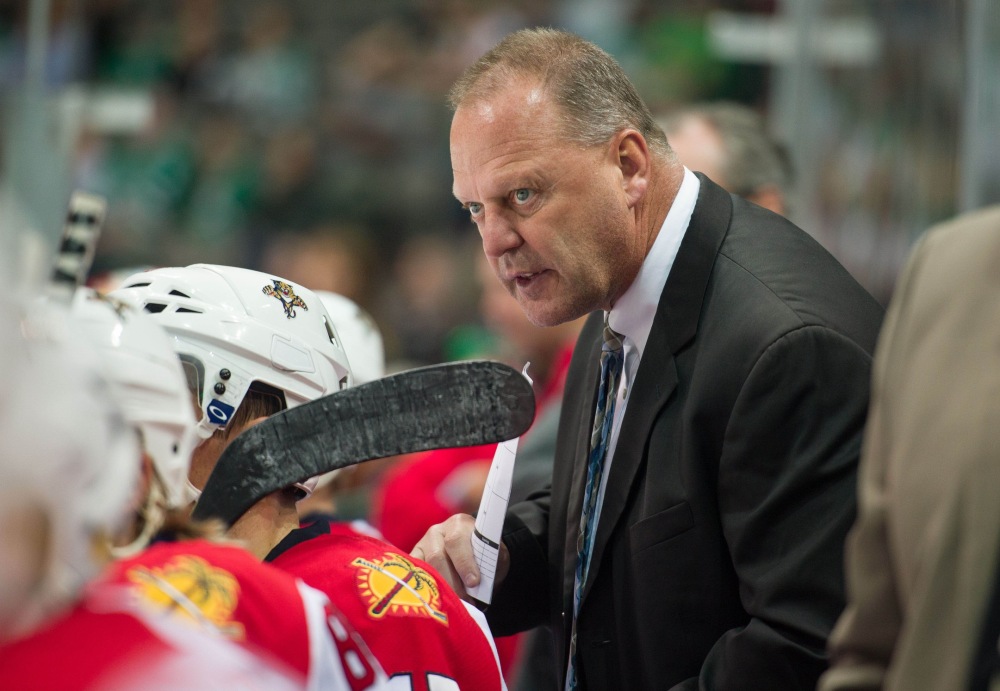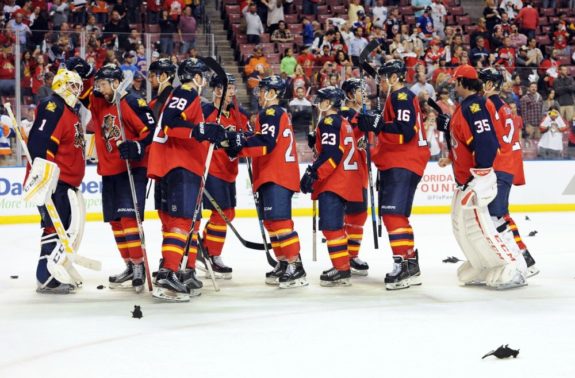After 103 points and an Atlantic Division title last season, the hockey world was, for the first time in, well, ever, cautiously optimistic about the Florida Panthers.
Cue reality.
The First Half
What Went Right
Goaltending is the great equalizer. Roberto Luongo just keeps chugging along, posting a .921 save percentage, good for 11th in the National Hockey League amongst goaltenders with 10 or more games played. James Reimer, after a rough start to the season, has settled into his role spelling Luongo and is giving the Panthers quality starts. Three of the Panthers’ top six defensemen (Jason Demers, Keith Yandle and Mark Pysyk) weren’t on the team last year. This stability in goal has allowed them to find their respective games and adjust to new systems of play.
What Went Wrong
According to Man-Games Lost, the Panthers are in the middle of the pack when it comes to the number of games Panthers players have lost due to injury. What this stat does not mention is the impact of their injured players. The Panthers’ injured reserve list includes Jonathan Huberdeau (first line left wing), Aleksander Barkov (first line centre) and Nick Bjugstad (offensive centre). The absence of these three critical pieces of the Panthers’ offense might help to explain why the team sits 26th in goals scored.
Early Season Surprise
Jonathan Marchessault, a cast-off from a crowded Tampa Bay Lightning forward corps (boy, the Lightning sure could use someone like him right about now), was picked up in the summer on a two-year deal for $750,000 per season. This deal looks like the bargain of the century; Marchessault ranks second on the team in both goals (13) and points (29), an incredible feat made more so considering he missed seven games earlier in the season. This first half puts the undersized pivot on pace for an impressive 24 goals and 53 points.
Marchessault is found money, but the two-year, one-way deal means the Panthers didn’t gamble on him, but instead made a calculated, well-researched decision to add his depth speed and scoring. He cost them next to nothing and, given the aforementioned ravages of injury, just might save their season.
Early Season Disappointment
The handling of the Gerard Gallant situation. To recap: The Panthers fired Gallant, their then-head coach, along with assistant coach Mike Kelly, after a mediocre 11-10-1 start. He was let go – over the phone – after a loss in Carolina at the start of a six-game road trip. Compounding the oddity of firing a coach who had led the team to over 100 points and a division title only seven months prior, Gallant was spotted waiting for a taxi outside PNC Arena just after his dismissal. Though this situation was explained away – Gallant had declined the offer of a car service – the image of Gallant seemingly being escorted out the back of the building endures as a representation of the Panthers’ dysfunction.

Oh and Tom Rowe, his replacement? He’s 9-9-8. Maybe the team’s disappointing start had more to do with injuries, statistical anomalies (discussed later) and the turnover of one third of the roster.
The Second Half
What Could Go Right
The statistics could normalize and the Panthers could begin to climb in the standings. Yes, they’ve played more games than most teams they would have to leapfrog and yes, there will likely be only the three Atlantic playoff slots available, given that the Metropolitan Division’s dominance should secure Metro teams the two wild card spots. The Panthers clearly have quite a hill to climb…until you look at the rest of the Atlantic:
The Montréal Canadiens
…will likely take the division in a walk, barring a Carey Price injury. Or a Carey Price illness. Or a Carey Price suspension. Or a Carey Price family situation. Or a Carey Price encounter with street toughs. Or a Carey Price obligation to help a friend move. Seriously, given how critical he is to his team’s success, you’d think the Habs would put him in stasis and only wake him up for games.
The Ottawa Senators
…are interesting. No one expected them to be here, especially after Craig Anderson had to take time off. However, given the nature of said time off, along with Guy Boucher’s rugged handsomeness, the Sens’ season has all the makings of a Hollywood classic. But they’re also the Sens, so let’s not get too excited.
The Boston Bruins
…are a weird team. Tuukka Rask is back on form and Brad Marchand is proving that his offensive explosion last season was no fluke. However, the usually reliable Patrice Bergeron and David Krejci, along with prize offseason acquisition David Backes, are all having horrendous years. The defense is an odd mix of young and old, and rumour has it that Claude Julien is all but fired. The Bruins are a prime candidate to self-destruct.
The Toronto Maple Leafs
…are perhaps the most exciting team in the league. They also hold leads like a sieve holds water and have all the defensive ability of wet Kleenex.
The Detroit Red Wings
…are like a 55-year old at a hip nightclub. Dude, shed the wide lapels and chest hair, you just don’t have it anymore. The Wings have some good young talent, but are going to have to stop obsessing about their playoff streak and tear it down one of these days.
The Tampa Bay Lightning
…are injured to kingdom come. Lightning fans: if you go to a game, make sure you carb up beforehand; there’s a good chance you’ll be playing second-line wing.
The Buffalo Sabres
…are the Buffalo Sabres. AKA, ol’ Gil from the Simpsons.
The Atlantic might be the least reliable division in hockey. If the Panthers can get on a good, solid, consistent pace – and have a stroke or two of not necessarily luck, but normalcy, they have a chance to be the tortoise that beats the hare (to the playoffs).
What Could Go Wrong
Their statistics might not normalize this year. Every season, there is a team that massively overperforms compared to their underlying numbers. The 2012-13 Maple Leafs, the 2013-14 Colorado Avalanche, the 2014-15 Calgary Flames… However, just as often, there are teams that should be better than they are. The 2014-15 Los Angeles Kings, fresh off a Stanley Cup, were a dominant possession team full of talented, experienced and accomplished veterans that inexplicably missed the playoffs. Maybe the Panthers, fourth in Corsi For percentage, are that team in 2016-17.
Season Successful if…
…the Panthers make the playoffs. Another division title was never realistic with a healthy Carey Price – and a pleasantly surprising Alex Radulov – improving last year’s gongshow of a Canadiens squad, but a playoff spot was definitely a reasonable expectation. Particularly after the organizational turmoil and injury problems they’re been through, any playoff spot at all would show off the character and potential of an already young, intriguing Panthers team.

Season Disappointing if…
…the Panthers miss the playoffs. After all of the progress that the front office has made in turning around the franchise’s business model and rebranding as a disciplined, military-like organization, it would be truly disheartening to see the on-ice product miss the playoffs. Not only would this be a step back, missing the playoffs would invalidate the front-office shuffling, roster turnover and, perhaps most embarrassingly, the Gallant move. Panthers fans deserve better.
Conclusions
The Panthers are not this bad. They are dead-last in the NHL with a 7.19 shooting percentage; that should normalize, especially when their stars begin to return from injury. Scoring chances, of which the Panthers are only generating 46% of every game, should also increase with time and a lineup at full strength. The best thing for the team to do would be to stay the course and strive for some sort of consistency. They’ve already made their bed with firing an experienced, well-liked coach who would have been best-suited to guide the team through this stretch. All they can do now is wait.
(All advanced stats are thanks to Corsica. All contract information is courtesy CapFriendly.)